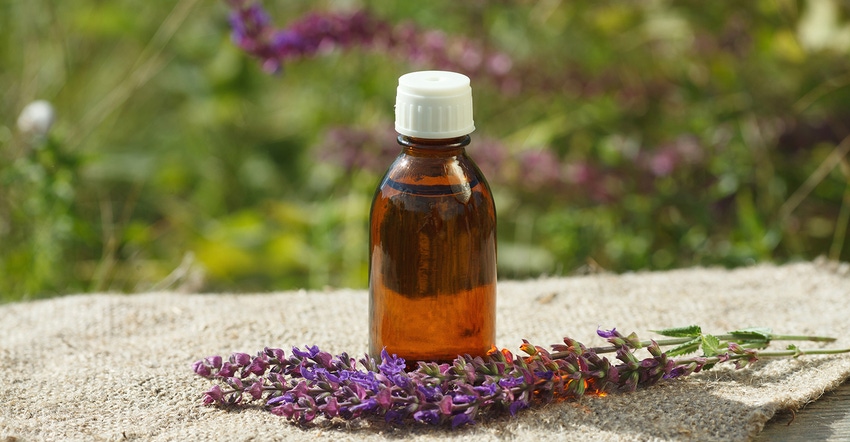Sage—a term used to connote a wise person—continues to demonstrate its benefits to cognitive health in scientific research.

It has become commonplace for Americans to live into their 80s and beyond, and by 2030, 1 in 5 adults will be 65 or older, according to the Centers for Disease Control and Prevention (CDC). Improved public health initiatives and advances in science and technology have made this possible. The increase in lifespan is reflected across the globe, but while people are living longer, older populations are still experiencing health concerns that diminish the quality of that sought-after longer lifespan. As such, the desire for better health is in high demand.
A greater desire for healthspan to mirror the population’s lifespan has created a drive among consumers to seek alternative methods. People, both old and young, want to embrace overall wellbeing. Becoming more proactive, 75% of American adults take dietary supplements, and 41% of those supplement-users have used herbs and botanicals, which has increased 13% since 2013, according to the 2018 Consumer Survey on Dietary Supplements from the Council for Responsible Nutrition (CRN). The resurgence of herbs and botanicals have returned consumers to the traditional roots of medicinal methods that have been around for centuries.
Pilgrim’s healing herb garden
In an age when religious knowledge held more sway than science, herbs and botanicals were a focal method of healing. In 11th century Great Britain, the ancient Abbey of Bury St. Edmunds was renowned for its healing miracles and drew pilgrims to the site of its relics. In 1065, Abbot Baldwin encouraged the use of herbal medicines to treat the thousands that flocked to the Abbey. The monks grew their own medicinal plants, including sage (Salvia officinalis), red clover (Trifolium pretense), yarrow (Achillea millefolium), foxglove (Digitalis purpurea) and chamomile (Matricaria chamomilla), believed to cure most ailments and ward off evil spirits in what is today called the Pilgrim’s Herb Garden. Today, the world’s modern populations have begun to earnestly turn back to historical remedies to discover better health through plants featured in traditional medicine, such as sage.
Varieties of sage
Sage has many different varieties, and each grows regions around the world. Almost 1,000 species of Salvia plants can be found in the Americas, Europe, Africa and Asia. Salvia has been known to be used for a large variety of medical purposes in folk medicine. In Europe, S. triloba (Greek sage) was used to prevent inflammation in the oral cavity and S. sclarea (clary sage) was used as a remedy for night sweats from menopause.1 Native to China and Japan, S. miltiorrhiza (red sage) has long been used in Traditional Chinese Medicine (TCM) to support the circulatory system.2 South African species, such as S. stenophylla and S. repens, have seen extensive use as disinfectants and laxatives.3
The most common variety of sage is S. officinalis (common sage or garden sage), which has seen the most extensive range of uses in conventional medicine. Traditionally, as a tea or essential oil, sage has long been used to address digestive, metabolic and circulatory issues, as well as an anti-inflammatory for the oral cavity.4 As science has continued to dive into the health effects of S. officinalis, research has shown it to be a strong player in the cognitive health sector.
Brain boosting botanical
In the 1500s, an English herbalist named John Gerard officially recognized sage’s positive impact on the brain, head and memory, and the physician Nicholas Culpeper further confirmed this in the 1600s, noted Gayle Engels, special projects director at American Botanical Council (ABC) in the 2010 HerbalGram article “Sage.” With the recognized impact that sage has on cognitive ability, many traditions have applied the word sage to people who are considered wise.
Current research conducted with extracts of S. officinalis on the aging population demonstrated positive effects in the cognitive function of study participants. The working memory, secondary memory and focus experienced significant performance improvements within one hour of administering a proprietary sage extract.5 Additional studies with young adults showed that appropriate doses of sage also elevated focus and mood.6 Sage has also shown to help reduce anxiety in participants while also increasing alertness, calmness and contentedness, as measured on Bond-Lader mood scales.7 Research continues to better analyze the extent that cognitive benefits are delivered across multiple age ranges.
A future for sage
With the variety of Salvia plants and the wide range of benefits they provide, this natural botanical opens opportunities to continue the research on how sage can benefit consumers and their health demands. With such great concern for healthy aging solutions, sage opens the doors for improved cognitive function supplementation. Both young and old can become more proactive with their health and wellbeing in hopes to live a longer, happier and healthier life.
For a list of references, email [email protected].
Kieron Edwards is scientific director at Sibelius Natural Products. Following his doctorate in plant genetics at the University of Warwick, Edwards has gained over 10 years’ experience of biological research in both an academic and industrial setting. Over this time, he has used genetic, genomic, transcriptomic, metabolomic and other systems approaches to investigate the regulation of physiological and biochemical traits in plants to support both fundamental understanding and trait development. As scientific director for Sibelius, these same approaches are now being applied as part of the Chronoscreen platform to support the development of natural products with beneficial effects on human health. In addition to his scientific training, Kieron also completed his MBA at the University of Cambridge’s Judge Business School in 2016.
References
Llurba-Montesino N, Schmidt T. “Salvia Species as Sources of Natural Products with Antiprotozoal Activity.” Int J Mol Sci. 2018 Jan 16;19(1). pii: E264. DOI: 10.3390/ijms19010264.
Wang L et al. “Salvia miltiorrhiza: A Potential Red Light to the Development of Cardiovascular Diseases.” Curr Pharm Des. 2017;23(7):1077-1097. DOI: 10.2174/138161282266616101010524
Kamatou G et al. “The in vitro pharmacological activities and a chemical investigation of three South African Salvia species.” J Ethnopharmacol. 2005 Dec 1;102(3):382-90.
Hamidpour M et al. “Chemistry, Pharmacology, and Medicinal Property of Sage (Salvia) to Prevent and Cure Illnesses such as Obesity, Diabetes, Depression, Dementia, Lupus, Autism, Heart Disease, and Cancer.” J Tradit Complement Med. 2014 Apr;4(2):82-8. DOI: 10.4103/2225-4110.130373.
Scholey, A et al. “An Extract of Salvia (Sage) with Anticholinesterase Properties Improves Memory and Attention in Healthy Older Volunteers.” Psychopharmacology (Berl). 2008 May;198(1):127-39. DOI: 10.1007/s00213-008-1101-3.
Tildesley N et al. “Positive modulation of mood and cognitive performance following administration of acute doses of Salvia lavandulaefolia essential oil to healthy young volunteers.” Physiol Behav. 2005 Jan;83(5):699-709
Kennedy D et al. “Effects of cholinesterase inhibiting sage (Salvia officinalis) on mood, anxiety and performance on a psychological stressor battery.” Neuropsychopharmacology. 2006 Apr;31(4):845-52.
About the Author(s)
You May Also Like






.png?width=800&auto=webp&quality=80&disable=upscale)